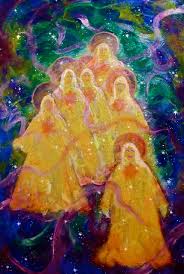Macarius and the World Soul March 16, 2015
Author: Beach Combing | in : Medieval , trackbackNothing like a medieval eccentric, there are so few of them: this was an age, after all, when originality was neither enjoyed nor, all too often, tolerated. How about Macarius then, allegedly an Irish monk though that name – Greek? – doesn’t seem Gaelic or the kind of name that Gaels would adopt in their continental wanderings. In the Liber de Anima (the book of soul) by Ratramnus, composed in the early 860s, we get a glimmer of Macarius, active in the 850s (?) in northern France: Macarius seems at this date to be already dead or at any rate not active. Macarius’ student, who is never named, had written an unorthodox text arguing, according to Ratramnus, that each man’s soul is part of a universal soul and stating too that these were the views of his teacher. A universal soul? A what?! These things were just not done in early Christian Europe! What did Macarius really mean? We don’t know as we have to trust the hostile Ratramnus to recount Macarius’s student views, who may, it must be remembered, have misrepresented his master. However, if we take Ratramnus’ words on trust, Macarius had taken a passage of Augustine (against the grain of the text) to mean that Augustine understood all souls to be both individual and part of a universal soul. (Porro anima cum est species, quod tunc existit quando rationalis accipitur, nunc de multis nunc de singularibus intelligitur. De multis cum dicitur omnis anima: de singularibus cum dicitur una.)
It is pretty exciting to see this (surely Platonic) idea emerging in the ninth century, and it extremely frustrating to have to learn about it from an Aristotelian dunce: but that’s the Carolingian Renaissance for you. There is one rather Platonic passage quoted whereby apparently Macarius’ student had compared the birth of creatures to a river running from a spring and to trees from roots: specie producantur more nascentium creaturarum, velut id e fonte producitur rivus, vel arbor de radice. The only other ninth century writer who would have dared to say something like this would have been John Scottus Eriugena who at just about this time was composing his Periphyseon, the greatest work of Neo-Platonism since the fall of the Western Empire and the greatest to come until perhaps the thirteenth century. John was, like Macarius, an Irishman (or at least a Gael). The coincidence of ethnicity suggests that ninth-century Scotti may have been more open to these philosophical speculations, one of the reasons they had such a bad (and yet brilliant) reputation on the continent in the period. Perhaps even that name Macarius gives us a clue. It is, as noted above, almost certainly Greek. Irish churchmen adopted new names when they left Ireland, often names with symbolic value. Perhaps Macarius had effectively rechristened himself as a Hellene? Other thoughts on Macarius: drbeachcombing AT yahoo DOT com



